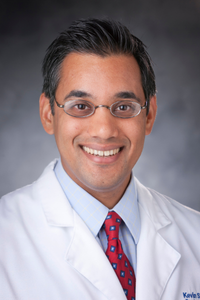
We’re delighted that you are here to explore Duke’s General Surgery Residency Program—a world-class, resident-centered training program dedicated to developing surgeon-leaders for our country and the world.
At Duke, the General Surgery Residency Program provides robust clinical training, a fully supported two-year research and academic development experience, and an educational program emphasizing skills for lifelong learning.
Clinically, our residents consistently graduate with impressive case numbers and an outstanding clinical experience across all areas of general surgery: from "bread and butter" general surgery to complex minimally invasive and robotic surgery, from multiorgan transplants to complex hepatobiliary reconstructions, from repairing complex congenital anomalies in neonates to safely caring for the surgical needs of the elderly.
A cornerstone of the residency program is our two-year research and academic development fellowship between the first two clinical years ("junior years") and final three clinical years ("senior years"). This projected, supported time is designed to equip our residents for future academic careers, including:
- Basic Science: High-impact research opportunities through our Division of Surgical Sciences or investigators throughout campus
- Translational Research: Numerous research opportunities at bench, preclinical, and first in human stages of translational research through our Division of Surgical Sciences and combined programs with Duke Biomedical Engineering
- Clinical Research: Research including degree opportunities through the Clinical Research Training Program (CRTP) and Duke Clinical Research Institute (DCRI)
- Duke Surgery Health Services Research: Multidisciplinary research into ways to improve healthcare access, delivery, quality, and outcomes, conducted by faculty across the department, including surgical oncology, transplant, trauma, and vascular surgery.
- Data Science, Artificial Intelligence, and Machine Learning: Cutting-edge research into how surgical AI can improve outcomes and optimize patient care, through Duke Surgery’s Surgical Artificial Intelligence and Innovation Laboratory (SAIIL)
- Global Health and Advocacy: Local and international projects and degree opportunities through the Duke Global Health Institute and the Duke Center for Global Surgery and Health Equity
- Surgical Education: High-quality education research projects and support through our Surgery Education Research Group (SERG), including simulation projects in our ACS-accredited Simulation and Educational Activities Lab (SEAL)
- Data Science and Healthcare Systems Innovation: Research in applying clinical informatics, artificial intelligence, and machine learning to addressing healthcare challenges through the Department of Surgery’s Laboratory for Transformative Administration (LTA) and Surgical Artificial Intelligence and Innovation Laboratory (SAIIL)
But more than anything we can tell you about the structure of our program and the results it delivers, our people are our greatest strength. Duke Surgery faculty are a group of surgeons with a wide range of experiences who are active locally, nationally, and internationally. They are not only committed to teaching technical
excellence, providing compassionate care, and moving the craft of surgery forward, but they also pride themselves on building a welcoming and supportive environment where our trainees can thrive.
Our residents embody the success of this culture, and our graduates consistently go on to remarkable careers. Most of our chief residents pursue advanced fellowship training and have an exceptional track record of matching into highly competitive fellowships at the programs of their choice.
We encourage you to watch the stories from our residents and faculty to learn more about what it means to be a Duke surgeon, and we hope you will consider applying to join us as a General Surgery resident!
Kevin Shah, MD
Program Director
General Surgery Residency

